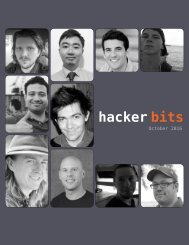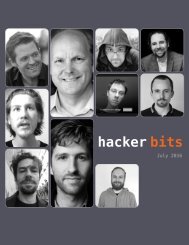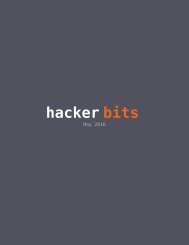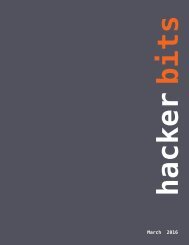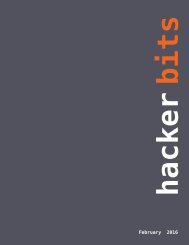Hacker Bits, April 2016
HACKER BITS is the monthly magazine that gives you the hottest technology and startup stories crowdsources by the readers of Hacker News. We select from the top voted stories for you and publish them in an easy-to-read magazine format. Get HACKER BITS delivered to your inbox every month! For more, visit http://hackerbits.com.
HACKER BITS is the monthly magazine that gives you the hottest technology and startup stories crowdsources by the readers of Hacker News. We select from the top voted stories for you and publish them in an easy-to-read magazine format.
Get HACKER BITS delivered to your inbox every month! For more, visit http://hackerbits.com.
You also want an ePaper? Increase the reach of your titles
YUMPU automatically turns print PDFs into web optimized ePapers that Google loves.
If you have questions about network<br />
traffic on your machines, maybe<br />
tcpdump is the tool for you!<br />
to me! There were 12 or so HTTP requests that<br />
happened. There's a 'Duration' column that tells<br />
me the total duration of the TCP session. So some<br />
of my requests took 47ms, and some of them<br />
took 655ms. The 47ms ones are Google, and the<br />
655ms one is ask.metafilter.com. What's up, Metafilter?<br />
Who knows. Metafilter was sending me way<br />
more packets (google was just like "lol redirect",<br />
10 packets, done), so I get that it takes more<br />
time. No big deal. That was super easy!<br />
I did this at work recently because my metrics<br />
were reporting that some HTTP requests were<br />
taking like 100ms each. I ran tcpdump, did the<br />
Wireshark thing above, and Wireshark was like<br />
"yeah those are all taking 3ms. Your metrics are<br />
wrong, or at least counting something other than<br />
just the network request!". This was a very helpful<br />
fact to know.<br />
With tcpdump I feel really confident that it's<br />
telling me the truth about what my network traffic<br />
is up to, because that's literally its whole job. And<br />
I can just capture packets and use it with Wireshark<br />
which is a really friendly and delightful tool.<br />
pcap files<br />
I mentioned really briefly that tcpdump lets you<br />
save pcap files. This is awesome because literally<br />
every network analysis tool in the universe understands<br />
pcap files. pcap files are like freshly baked<br />
chocolate chip cookies. Everybody loves them.<br />
Filtering packets<br />
Okay, so now let's imagine we're on a box where<br />
a lot is going on. We want to capture some TCP<br />
traffic to analyze it later. But not all the traffic!<br />
Only some of it. I mentioned before that you use<br />
"pcap filter rules" to do this. I only know how to<br />
do literally 2 things — filtering on port and IP<br />
address. Here's the 3 second Julia tutorial on pcap<br />
filter rules.<br />
stuff being sent to port 80:<br />
dst port 80<br />
you can use booleans!<br />
src port 80 or dst port 80<br />
here's how to filter on IP:<br />
ip src 66.66.66.66<br />
I don't know why it's src port $ip but ip src $ip.<br />
If I get it wrong I just try to switch the order. You<br />
can go read the docs and do much more complicated<br />
filtering but this has been good enough for<br />
me so far.<br />
To learn more about this, read about the<br />
[Berke].<br />
Overhead (is it safe to run<br />
tcpdump on my production<br />
machine?)<br />
Short answer: I think so, mostly.<br />
Longer answer: I don't quite know. But here's what<br />
I do know.<br />
I watched this great talk by Dick Sites, who<br />
works at Google (which you should totally watch if<br />
you're into awesome performance stories) where<br />
he mentioned that any time he introduces a performance<br />
monitoring tool that takes up more than<br />
1% of resources in overhead, he needs to have a<br />
long serious conversation with the datacenter administrators.<br />
He said that tcpdump is an example<br />
of something that's too expensive.<br />
But I don't think his requirements are my requirements<br />
(if a thing I administer gets 5% slower<br />
for 10 minutes while I collect network packets, it's<br />
no big deal).<br />
tcpdump uses this pcap filter language, and<br />
thomas ptacek mentioned to me on Twitter the<br />
38 hacker bits








